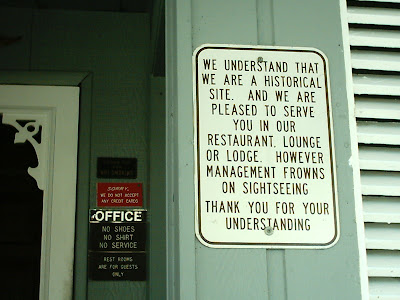
I was really looking forward to the heat of the Florida Everglades, to seeing a 'gator or two, and to talking to the locals in one of the few towns around. We drove into such a town center one day.
“We’re all white, five-hundred and thirty-six people, and twenty-five blacks.”
“No Seminole?”
“One [man], and his wife is white.”
We could tell that conversation was going nowhere, even just a minute or two after wandering into the town hall office which was located at the end of a hallway with doors opening onto a playschool, the one-room local library and other civic sites. They had all been united into a tiny, eloquent municipal mall in this large, solid building. Outside the front door, columns and flowers adorned the front steps, which we quickly saw again. No one asked where we were from or how we liked it there, poised at the end of a road which led back into the old route running between Miami and Naples. Up-scale properties are close by, and landscapers sometimes take their customers into the Everglades to select plants for their gardens from the steamy plantations.
But this felt more like a frontier town, with swampland behind it and the Gulf of Mexico in front. Normally there are boat services for ricocheting through the water around the coast islands. There was nobody at the docks or at the ice cream stand.
We tried to acquire a cool drink at a local restaurant, where a large sign on one of the club doors caught my attention. Considerable time and energy go into arriving at that door, and when you do, you read the sign and get the feeling that they don’t appreciate all the effort that has gone into your trip. I was left wondering what was most important about the club’s history, whether rowdy sightseers had disturbed the atmosphere in the club in the past, or whether burglars had caused damage. Was a dress code firmly in place? I posed all of these questions in an e-mail, but so far there has been no reply.
“We’re all white, five-hundred and thirty-six people, and twenty-five blacks.”
“No Seminole?”
“One [man], and his wife is white.”
We could tell that conversation was going nowhere, even just a minute or two after wandering into the town hall office which was located at the end of a hallway with doors opening onto a playschool, the one-room local library and other civic sites. They had all been united into a tiny, eloquent municipal mall in this large, solid building. Outside the front door, columns and flowers adorned the front steps, which we quickly saw again. No one asked where we were from or how we liked it there, poised at the end of a road which led back into the old route running between Miami and Naples. Up-scale properties are close by, and landscapers sometimes take their customers into the Everglades to select plants for their gardens from the steamy plantations.
But this felt more like a frontier town, with swampland behind it and the Gulf of Mexico in front. Normally there are boat services for ricocheting through the water around the coast islands. There was nobody at the docks or at the ice cream stand.
We tried to acquire a cool drink at a local restaurant, where a large sign on one of the club doors caught my attention. Considerable time and energy go into arriving at that door, and when you do, you read the sign and get the feeling that they don’t appreciate all the effort that has gone into your trip. I was left wondering what was most important about the club’s history, whether rowdy sightseers had disturbed the atmosphere in the club in the past, or whether burglars had caused damage. Was a dress code firmly in place? I posed all of these questions in an e-mail, but so far there has been no reply.




